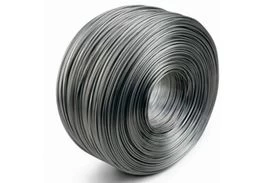
- General Product Name : Stainless Steel Wires
- Product Category : Steel and Iron Products
- Compliance Name : BIS / ISI Certification
- Indian Standard : IS 6528:1995
Stainless steel wires are indispensable components known for their exceptional strength, corrosion resistance, and versatility across many applications. Composed primarily of iron, chromium, nickel, and other alloying elements, these wires exhibit remarkable corrosion resistance, making them suitable for use in challenging environments, including marine, chemical, and food processing industries. The manufacturing process involves precision techniques such as cold drawing or annealing to achieve specific diameters, mechanical properties, and surface finishes. Stainless steel wires find extensive use in construction, automotive, aerospace, and various industrial sectors, serving diverse purposes such as cable reinforcement, fasteners, springs, and electrical components. The availability of different grades, each tailored to specific needs, allows for customization based on factors like corrosion resistance, strength, and thermal stability. Renowned for their longevity and low maintenance requirements, stainless steel wires play a crucial role in enhancing the durability and reliability of a wide array of products and structures in modern engineering and manufacturing.
IS 6528:1995 is of significant importance in the stainless steel industry as it establishes specific standards for stainless steel wires. This standard plays a crucial role in ensuring the quality and reliability of stainless steel wires by specifying criteria for chemical composition, mechanical properties, dimensions, and testing methods. Compliance with IS 6528:1995 enables manufacturers to produce stainless steel wires that meet industry benchmarks, ensuring consistency and reliability across different applications. The standardization provided by IS 6528:1995 not only enhances the performance and longevity of stainless steel wires but also promotes interoperability and interchangeability in diverse industries. Adhering to these standards is fundamental for maintaining the integrity and quality of stainless steel wires, ultimately contributing to the overall efficiency and safety of products and structures in which these wires are employed.
Note: Foreign manufacturers of stainless steel wires are required to obtain the mandatory BIS/ISI Certification to export their products to the Indian market.
BIS/ISI Certification is a mandatory requirement for foreign manufacturers intending to export their products to India. This certification ensures that stainless steel wires adhere to the stringent quality and safety standards set by Indian authorities. The BIS/ISI certification process involves a comprehensive evaluation of the product, confirming its conformity to established benchmarks and providing assurance to consumers, regulatory bodies, and stakeholders regarding its reliability and performance. For foreign manufacturers, compliance with BIS/ISI certification is not merely a legal obligation but also a strategic imperative for successful market entry into India. It signifies the manufacturer's commitment to producing goods that align with the specified standards, fostering trust and confidence among consumers. Adhering to BIS/ISI certification requirements for Stainless Steel Wires is crucial for facilitating seamless trade, ensuring that products entering the Indian market meet the prescribed criteria for quality and safety.
The BIS/ISI Certification is a hallmark of product quality and safety in India, administered by the Bureau of Indian Standards (BIS). Established in 1987, BIS is a statutory body under the Bureau of Indian Standards Act 1986, responsible for setting, maintaining, and ensuring compliance with standards across various sectors. It upholds the legacy of the Indian Standards Institution (ISI), founded in 1947 and introduced the ISI mark as an emblem of quality. BIS continues this legacy by formulating standards and granting BIS/ISI Certification to products that meet the stringent quality and safety criteria defined by the organization. The Bureau of Indian Standards has been operating the Foreign Manufacturers Certification Scheme (FMCS) since 2000, as per Scheme-I of Schedule-II, BIS Act, 2016, and (Conformity Assessment) Regulations, 2018, specifically designed for foreign manufacturers. This scheme empowers international applicants and manufacturers to utilize the ISI Mark for exporting their products in India. The exclusive authority responsible for awarding the BIS Certificate for imports to foreign manufacturers is the Foreign Manufacturers Certification Department (FMCD). The primary objective behind BIS providing Manufacturing Certificates to foreign manufacturers is to ensure that the public in India has access to high-quality, safe, reliable, and risk-free products.
Complete your BIS/ISI Certification process by following these steps:
Step 1: Application Submission
- Gather all required documents
- Submit documents and the Application Fee
- Receive the Application Number
- Scrutinize the Application within the specified time frame
Step 2: Query Raised (If any)
- Receive communication about any missing documents or non-compliance
- Respond within the given period
For more detailed information, please click here.
Here is the list of documents required for foreign manufacturers for BIS/ISI Certification in India:
● Main Application Form V - (View / Download)
(Primary factory and product category information)
● ISI Application Fee - (View / Download)
(Copy of Remittance / Payment Advice)
● In-House Laboratory Test Report
(Indicating product compliance with the relevant Indian Standard, conducted within one month)
For more detailed information, please click here.
Export Approval, powered by Brand Liaison, is a single platform solution for various product certifications and approvals in India. We are one of the leading compliance consultant that provide essential Indian certification services to manufacturers to export their products to India. Our services include:
- Comprehensive support for paperwork, testing, and guidance.
- Sample development meeting standards for complete conformity in testing labs.
- Detailed application preparation and timely query responses.
- Free license maintenance for 2 years.
Download Brochure
Process & Guidelines